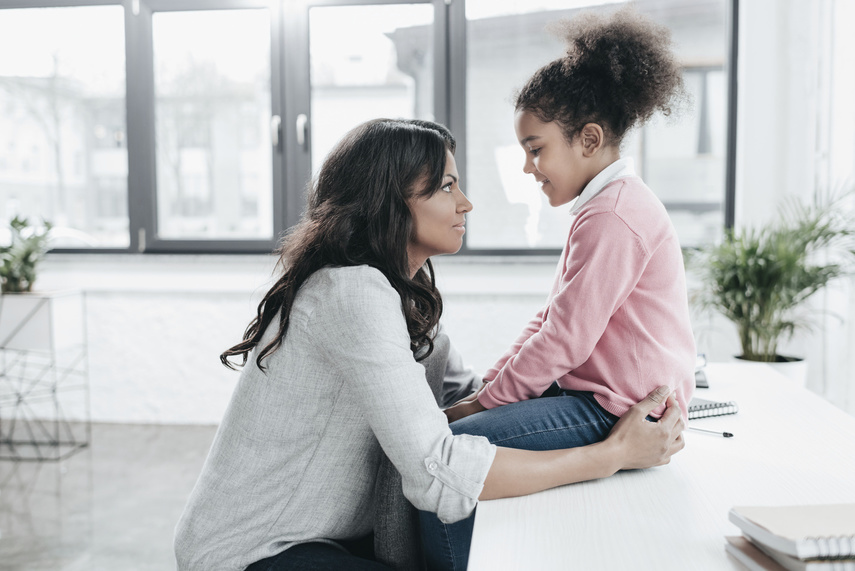Helping your child cope with separation anxiety

When your baby can’t seem to fall asleep in their crib after weeks of trying, or daycare drop-off always sparks a toddler tantrum, your child may be experiencing separation anxiety.
“Separation anxiety is very common,” says Angelica Espinosa-Louissaint, MD, a pediatrician and co-founder of Commonwealth Pediatrics in Boston Children’s Primary Care Alliance. “It often starts around 8 months old, peaks around 12 to 18 months, and generally resolves by ages 2 to 3.”
Separation anxiety signals development
Each child experiences separation anxiety a little differently, but the most common expression is distress in the presence of unfamiliar people, places, or things. It may worsen when a parent or primary caregiver leaves the child.
“Frustrating as it may be in the moment, separation anxiety actually signals key milestones in your child’s development,” Dr. Espinosa-Louissaint says.
First, they’re beginning to realize they’re a separate physical entity from you. They’re also starting to distinguish between the familiar and unfamiliar.
The problem arises when they become anxious with people or places they don’t recognize.
“Children can be clingy, cry often, and not want to let their caregiver out of their sight,” Espinosa-Louissaint says. “That’s because they now understand that you can separate from them, but they don’t yet grasp that you’re going to come back.”
Helping an infant or toddler with separation anxiety
“The earlier you introduce family, friends, and babysitters to your child, the milder their separation anxiety should be,” Espinosa-Louissaint says.
“Infants and toddlers will warm up to new people if they see their caregiver positively engaged with that person,” she says. “It signals that it’s a safe situation.”
Before introducing your infant or toddler to someone new:
- wait until your child reaches for the new person
- remind the new person to take it slow
- make sure your child has eaten recently and had a nap
- be reassuring and cheerful
- respect your child’s boundaries (i.e., don’t make them hug someone, even if they are a relative)
Helping an older child with separation anxiety
“Separation anxiety may evolve into shyness or even social anxiety around age 3,” Dr. Espinosa-Louissaint says.
“It’s important for children at all stages of development to learn how to engage socially. Those who never grow out of their separation anxiety may need extra encouragement and support in preschool or elementary school,” she says.
Try being exceedingly positive with your child. Build their self-confidence by praising their “wins” but also their effort, no matter the outcome.
Encourage them to explore social activities like clubs, sports, and volunteering. “They’re great for physical and emotional health,” Espinosa-Louissaint says. “And the more enjoyment they get, the less conscious they’ll be of making new friends.”
When to talk to your pediatrician
Talk to your pediatrician if intense separation anxiety lingers into preschool, elementary school, or beyond and interferes with everyday life.
This could signal a rare, serious condition known as separation anxiety disorder. Kids with this disorder are fearful of change and being cut off from their family. Signs can include:
- excessive worry about being lost or kidnapped
- nightmares about separation
- fear of sleeping alone
- panic symptoms (shortness of breath, nausea, vomiting) or panic attacks before a parent leaves
A mental health specialist can diagnose and treat separation anxiety disorder. Treatment can address physical symptoms and equip your child with coping strategies and problem-solving skills.
For most children, separation anxiety will pass. Even so, a specialist can also help your family implement a more reliable bedtime or daycare drop-off routine.
“The first thing to do is reach out to your pediatrician,” Dr. Espinosa-Louissaint says. “They will help you determine if your child needs further evaluation, and if so, with whom.”
Many Boston Children’s Primary Care Alliance practices offer support for mental and behavioral health. Find a practice near you.
Related Posts :
-

Behavioral health: What parents should know
Even before a worldwide pandemic uprooted life as we knew it, our children have been grappling with an unprecedented health ...
-

How to help your child make and rekindle friendships at any age
Childhood friendships are key for mental and physical health. But friends come and go as a child ages, as they ...
-

Is it “good” or “bad” for your child? Removing morality from eating
Teaching our children to eat well is not a simple task — but perhaps that’s because we are looking at ...
-

Ten questions to ask when choosing a pediatrician for your family
Selecting a pediatrician is an important decision and one that parents shouldn’t take lightly. Pediatricians specialize in caring for ...





